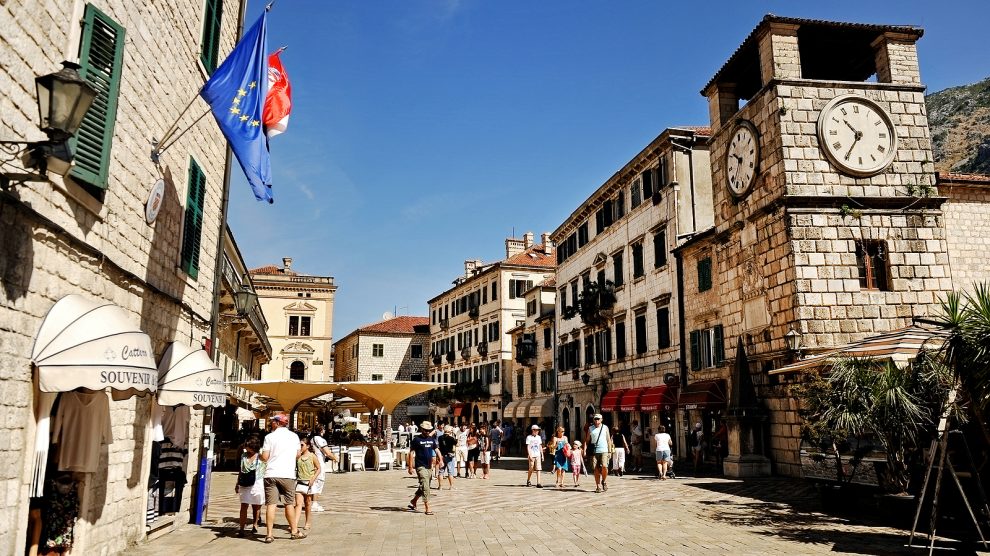Montenegro began EU membership talks in June 2012. Since then, it has opened 33 out of 35 negotiation chapters, of which only three have been completed—and those only provisionally.
A short scene from the Ukrainian comedy series Servant of the People, in which Volodymyr Zelensky plays a beleaguered schoolteacher who unexpectedly becomes Ukraine’s president, did the rounds of social media late on December 14, shortly after the European Council had given Ukraine (and Moldova) the green light to begin EU accession negotiations.
In it, Zelensky—playing the fictional president Vasyl Goloborodko—receives a phone call from German Chancellor Angela Merkel. We’ve decided to bring your country into the European Union, says Merkel. What wonderful news, replies Goloborodko, wonderful news for all Ukrainians.
Merkel pauses. Ukraine?, she then says. Oh, sorry, there’s been a mistake. I actually meant to call Montenegro.
Goloborodko’s initial jubilation is quickly replaced by disappointment. Ukrainians, should they examine the real process of Montenegrin EU accession, could be forgiven for feeling similarly disappointed.
- Lots of carrot, plenty of stick: The EU’s new growth plan for the Western Balkans
- Economy in focus: Montenegro
- EU hints at Single Market access for Western Balkans, in return for reforms
Montenegro began EU membership talks in June 2012. Since then, it has opened 33 out of 35 negotiation chapters, of which only three have been completed—and those only provisionally.
In its latest review of Montenegro’s application, the European Council welcomed the overall progress made on accession but stated that the fulfilment of rule of law interim benchmarks was the utmost priority for further progress. Until this milestone is reached, no further chapters will be provisionally closed.
Like Ukrainians, Montenegrins overwhelmingly support EU membership. According to the European Union’s External Action Service (EEAS), 78.5 per cent of Montenegro’s people back EU membership.
However, around 41 per cent of Montenegrins believe that the accession process is not moving fast enough or is moving very slowly.
A positive attitude towards the EU and high support for the membership impose additional obligations but also provide a strong incentive both for the Ministry of European Affairs and the government as a whole, says the Montenegrin Minister of European Affairs Maida Gorčević.
“It’s an incentive to work even more dedicatedly, efficiently, and better to fulfil all the conditions of the accession process and ensure that Montenegro becomes the next EU member. In this direction, we will continue to work towards achieving European standards and improving the quality of life for our citizens, which is the most important goal of this European government,” she adds.
Widely regarded as the EU’s next member state, Montenegro likely still has years to wait before it can hope to join the bloc. Ukraine and Moldova will almost certainly have to wait even longer.
No more short cuts
To reach this point, both countries have the recipients of a great deal of goodwill in Brussels, brought about by Russia’s invasion of Ukraine in February 2022.
Russia invasion was only four days old days when Ukraine signed an official request to join the EU, a move that was followed within days by Moldova and Georgia (this week granted candidate status), which also both have territory occupied by Russia.
The granting of applicant status alone usually takes a minimum of 18 months from the moment that an application is filed; that Ukraine and Moldova have in that time frame moved on to accession talk status suggests special treatment.
But there should be little doubt in either Kyiv or Chișinău that the accession process will from here on in be based on established criteria and conditions, and that neither Ukraine nor Moldova will be allowed to take any more short cuts.
Jubiliation in the two capitals is warranted—the green light for accession talks is a signal that both countries have a clear path towards the EU.
It also sends a clear signal to Russia that the future of both countries will not be decided in Moscow.
But they will also do well to remember that Croatia was the last country to join the EU, in 2013, and although its economy, political system and judiciary were far more aligned with Brussels when it began accession negotiations, the process still took 10 years.
As Montenegro can testify, it can often take even longer.
Unlike many news and information platforms, Emerging Europe is free to read, and always will be. There is no paywall here. We are independent, not affiliated with nor representing any political party or business organisation. We want the very best for emerging Europe, nothing more, nothing less. Your support will help us continue to spread the word about this amazing region.
You can contribute here. Thank you.







Add Comment